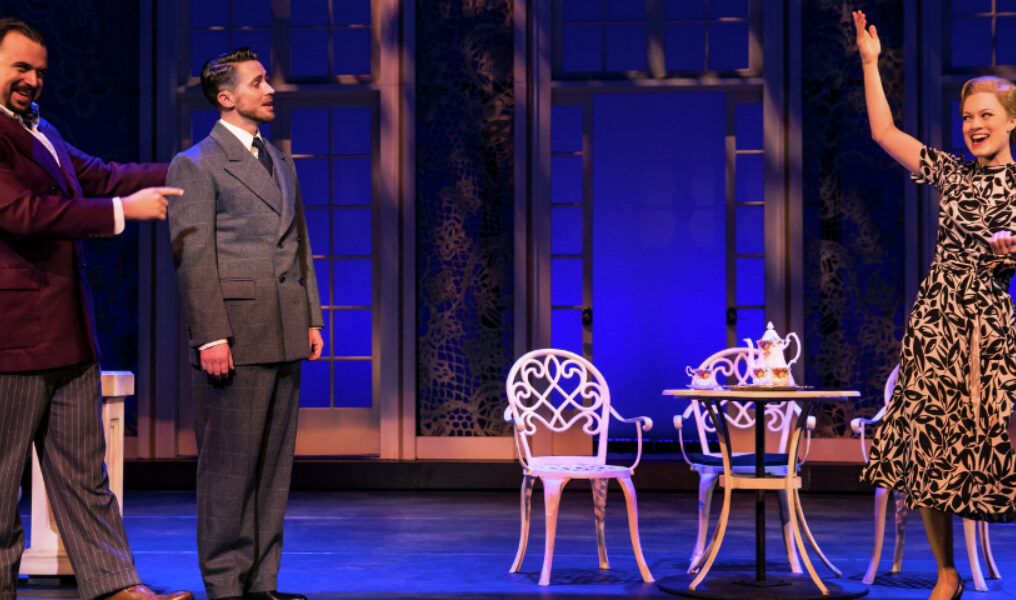Although the audience never sees it, a scene change in a musical performance is the product of a well-engineered and well-oiled machine. Many crew members must seamlessly perform dozens of specific actions to set scenery and props in place. Then, as actors take their marks, the flurry of motion stops, the curtain is pulled up, the lights go on and the scene begins. To actress Melissa McKamie, this is her reality every night as she plays Elsa Schraeder in the touring version of Rodgers & Hammerstein's "The Sound of Music" — and it's her favorite part.
"I love the first moment that I enter on stage, the way they transition with the lighting and the music. It's wonderful," McKamie said. "You know, before I even say a word the light comes up and you see my costume which is designed by Jane Greenwood, a Tony Award-winning costume designer, and you see this picture of Elsa. I feel the audience's energy and their reaction to that, and that's very exciting."
The Oklahoma City University grad has been a part of almost two dozen national and regional theater tours in which she played iconic roles like Cinderella and Mary Poppins. McKamie was also a student of Florence Birdwell who in her 60-year career has taught other notable names like Kristin Chenoweth, Kelli O'Hara and Lara Teeter.
Between The Lines spoke with McKamie one-on-one before "The Sound of Music" makes its debut at the Fox Theatre stage on March 30 and 31, getting a feel for the actress's fresh take on her character, her thoughts on coming out as bisexual in the world of theater and how "The Sound of Music" may be more relevant than ever.
When people hear the title "The Sound of Music" it's not unlikely that they think of the 1960s film starring Julie Andrews as Maria von Trapp and Eleanor Parker in your current role as Baronness Elsa Schraeder. Was it challenging to play a character that audiences feel they know already?
Yes, definitely. Playing Elsa has been such a challenge because so many people have seen the movie and they have their own ideas and projections about her coming in. I really worked with the director and he wanted her to be more nuanced, more interesting, more of a real human instead of the caricature that people remember from the movie. So, it's been challenging to try and change peoples' minds in that way about her.
The movie was so popular that it kind of overshadowed the Broadway production, but, luckily, the live TV rendition with Carrie Underwood a few years back, it introduced a whole new crowd of people to the show. And I think that's what we're hoping to do with this production, too, is making it fresh and relevant for today's audience. I know that it's been so wonderful to see different people in the audience during our bows, and see small children with their grandparents, it's awesome. It's just really cool to be able to bring this story to them. It's something that their grandparents grew up with, and they can share with their kids. It's a story about the human experience in general.
Though many might not think of it that way, "The Sound of Music" is a pretty politically-charged musical. Do you find it to be relevant to the political landscape now?
Definitely in terms of terms of the division of where they are in 1938 Austria. It is interesting how it parallels where we are today in terms of extremism and as Elsa, she does not pick a side, and I know there are many people in our country who are the same, who are comfortable not taking a side. And it's definitely because she comes from a place of privilege. She's not on the front lines, she has the advantage to ignore it if she wants to, and she does.
Much of Elsa's storyline is that she is seeking to be remarried. Has being married to your wife in real life aided in your portrayal of Elsa?
It is in the fact that, Elsa, she has been married before and her husband passed away. So, she knows what it's like to feel that love, and it's definitely helpful being married myself and bringing that into the role.
Have you found that being part of the LGBTQ community is something that aided or hindered your work significantly?
I didn't know that I was a part of the LGBT community until I fell in love with my wife, so it was kind of a shock to me. So, I think going through that, coming to terms with myself, was bigger than being out in the theater community, and I'm lucky to be in the theater community because it is so diverse and so acceptable in the business.
Did it challenge you in the way you portrayed heterosexual roles when you finally were coming to terms with who you are?
I don't think it has challenged me playing in heterosexual roles at all, which is just the same. I was used to playing the ingenue and the love interest, but then when I found out I was in love with her — my wife — and there was a point where I did not audition because of the rejection that I felt from my family and from the community. Not the theater community, but just the world in general, the country in general.
Because, when you go to an audition — the way I was taught — was to be completely present and vulnerable in yourself, and you have to really have a sense of who you are and the confidence when you enter a room to be vulnerable. And, at that time you know, coming in with the rejection already there, I did not audition for quite a while.
What gave you the strength to get back into auditioning again?
You know, honestly, we were engaged after same-sex marriage was legalized in New York pretty quickly. It was legalized in June of 2011 and then we were married in September, and after we were married I felt this huge sense of relief — for whatever reason — just having that word attached was so important in terms of our families. Our families both came around when we got married. And, having done that, it kind of gave me permission to go back and try the theater world again.
I think, before then, people just thought I was going through a phase (laughs) even though, before then, my wife and I, we were together for five years before we got married. But, for whatever reason, for the people around me the label attached to it of being married, it took that for them to fully accept us.
How did you get involved in theater?
I grew up in Texas and Oklahoma kind of equally, and I started taking piano lessons around the age of six and loved music from that time on. I started voice lessons around 12 and caught the theater bug around then. I decided to study it in college at Oklahoma City University. That's where I met Florence Birdwell who is an incredible teacher still today and she taught me everything I know.
What do you think is something that the audience might not expect from the stage version of the play?
The cool thing about theater is that it's live and it's all happening right in front of your face (laughs), so that is the advantage that we have over film. We do respond to the audience's energy even if it is in a way of, "I'm going to prove you wrong!" Or I'm going to play into the reaction.
"The Sound of Music" will be at the Fox Theatre from Friday, March 30 through Saturday, March 31. Tickets start at $26. More information about ticketing and showtimes can be found online at ticketmaster.com or at gaybe.am/o6. The theater is located at 2211 Woodward Ave., Detroit, and can be reached at 313-471-3200.











